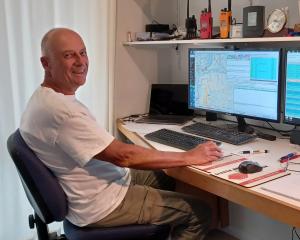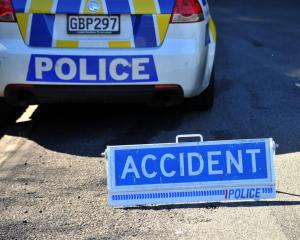
Brazilian national Evellyn Hitori Maeda Magahlaes was driving to Queenstown on November 19 when her car struck Philip Watson’s Triumph motorcycle on State Highway 8 between Lindis Pass and Tarras.
It was the day before his 65th birthday.
Maeda Magahlaes, 29, admitted a charge of careless driving causing death in February.
At her sentencing in the Queenstown District Court today, several members of Mr Watson’s family read emotional victim impact statements, although their contents were suppressed by Judge David Ruth.
Police say the defendant left Auckland two days before the accident to pick up her brother from Queenstown Airport, and had spent the night in Cheviot, North Canterbury.
About 8.45am, as she looked at a navigation app on her dash-mounted phone, she veered into the opposite lane and collided head-on with Mr Watson.

Prosecuting Sergeant Ian Collin said the defendant told police in her first interview she slept for only four hours the night before the crash.
By the time of the accident, she had already been driving for five and-a-half hours.
Her decision to drive while sleep-deprived was a causative factor in the crash, Sgt Collin said.
He sought a sentence of imprisonment, along with a driving disqualification and reparation.
Defence counsel Bryony Shackell said police had focused on how much sleep the defendant had had, but her initial comments to police had been made under the influence of powerful drugs she had been given for her own trauma.
A subsequent check of messages to family members showed she had slept for six and-a-half hours the night before the crash, and nine and-a-half hours the night before that.
There was no evidence of the defendant’s driving being ‘‘anything but exemplary’’ before the accident, Ms Shackell said.
She asked for a community work sentence, saying the defendant was a ‘‘kind, caring and generous’’ person, with a nursing qualification, and no previous convictions in New Zealand or elsewhere.
Maeda Magahlaes was not in a position to offer reparation, because her visa status since the accident meant she had not been able to work.
She had no savings and was relying on financial support from family and friends.
Judge Ruth told the victim’s family that even a sentence of life imprisonment ‘‘would not bring Phil back’’.
He asked them to consider what Mr Watson would have done if he had been representing the defendant.
‘‘He would have done everything in his power to put his case forward — that was the kind of man and lawyer he was.’’
The defendant had not been speeding, influenced by alcohol or drugs, or flouting any law, but had allowed her car to drift across the road while she was distracted.
Hands-free devices were no guarantee of avoiding distraction, and there would be few drivers who could claim they had not been similarly distracted.
‘‘This should be a cautionary tale for all of us.’’
He told the defendant it was ‘‘more luck than good management that none of us face what you face’’.
He imposed a sentence of 150 hours’ community work, and disqualified her from driving for 12 months.













